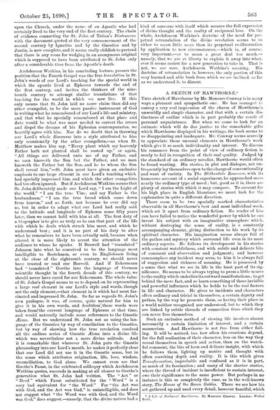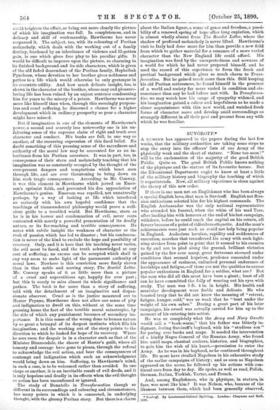A SKETCH OF HAWTHORNE.* This sketch of Hawthorne by Mr.
Moncure Conway is in many ways a pleasant and sympathetic one. He has managed to convey a very real impression of the charm of Hawthorne's unworldly and simple character, and that with a certain dis- tinctness of outline which is in part probably the result of personal acquaintance. But when we come to look for an estimate which will do due justice to the remarkable gifts which Hawthorne displayed in his writings, the book seems to us disappointing and inadequate. Mr. Conway seems scarcely to appreciate those unusual elements in Hawthorne's work which give it so much individuality and interest. To discuss his romances from the point of view of ordinary fiction is surely to fail in recognition of their real quality. Judged by the standard of an ordinary novelist, Hawthorne would often be found wanting. His stories, in plot and dialogue, not un- frequently lay themselves open to the charge of conventionality and want of variety. In The Blithesdale Romance, with its humorous account of a social experiment, he approached more nearly the ordinary type of novel ; but, good as it is, there are plenty of stories with which it may compare. To account for his high place in English literature, we must look for the explanation in quite a different direction.
There seem to be two specially marked characteristics observable in all Hawthorne's best and most individual work, which set it apart from ordinary fiction. No reader of him can have failed to notice the wonderful power by which he can invest his subject with an imaginative atmosphere which, without destroying the sense of reality, is a constantly accompanying element, giving distinction to his work by its spiritual character. His imagination seems always full of the pathos and mystery which surround life even in its most ordinary aspects. He follows its development in his stories with constant watchfulness, and with subtle and delicate bits of comment and observation and judgment ; and however commonplace any incident may seem, to him it is always full of suggestion and richness of meaning. He is possessed by a sense that what we see in life is the least part of its sig- nificance. He seems to be always trying to press a little nearer to the reality which underlies its outward manifestations , to get behind the mere fact, and so learn something of those invisible and powerful influences which he holds to be the real factors in life and character. He gives to incidents and characters often ordinary and trivial in themselves, a certain dignity and pathos, by the way he presents them, as having their place in a world neither recognised nor understood, but to which they are linked by subtle threads of connection from which they can never free themselves.
Such an exclusive method of viewing life involves almost necessarily a certain limitation of interest, and a certain mannerism. And Hawthorne is not free from either fail- ing. It will be noticed, too, how often his creations depend, for the full realisation of their character, leas on the way they reveal themselves in speech and action, than on the watch- ful comment, the bits of keen and delicate insight, with which he follows them, lighting up motive and thought with often searching depth and reality. It is this which gives Transformation, improbable and confused as it is in part, so much of its fascination ; and many of the shorter stories, where the thread of incident is insufficient to sustain interest, owe their significance to the same power. But perhaps in no instance is this so completely the case, as in the well-known story, The House of the Seven Gables. There we see how his art gathered up and used every detail, however fanciful, which
• A Life of Nathaniel Hawthorne. By Nomura Conway. London ; Walter Scott. could heighten the effect, or bring out more clearly the picture of which his imaaination was full. In completeness, and in delicacy and skill of workmanship, Hawthorne has never surpassed it. The subject, too, with its colouring of Puritan melancholy, which deals with the working out of a family destiny, burdened by an inheritance of violence and ill-gotten gain, is one which gives free play to his peculiar gifts. It would be difficult to improve upon the picture, so charming in its finished background and its side characters, which is given of the old faded descendant of the Puritan family, Hephzibah Pyncheon, whose devotion to her brother gives nobleness and pathos to a life which would otherwise be only grotesque in its eccentric oddity. And how much delicate insight, too, is shown in the character of the brother, whose easy and pleasure- loving life has been ruined by an unjust sentence condemning him for years to the misery of a prison. Hawthorne was never more like himself than when, through this seemingly purpose- less and cruel suffering, be discerned a chance for a higher development which in ordinary prosperity so poor a character might have missed.
But if imagination is one of the elements of Hawthorne's power, a second and scarcely less noteworthy one is his un- faltering sense of the supreme claim of right and truth over character and conduct. His books are full, in one way or another, of the recurring expression of this fixed belief. No doubt something of this pressing sense of the sacredness and authority of the moral law may be accounted for as an in- heritance from his Puritan ancestors. It was in part, too, in consequence of their stern and melancholy teaching that his imagination was so constantly occupied by the thought of the ever-present dangers and temptations which beset man through life, and are ever threatening to bring down on him such tragic consequences. According to Mr. Conway, it was this element in Hawthorne which jarred on Emer- son's optimist faith, and prevented his due appreciation of Hawthorne's genius. Emerson was repelled, not unnaturally perhaps, by a way of looking at life which interfered so seriously with his own hopeful confidence that the teachings of transcendental philosophy would prove a suffi- cient guide to a troubled world. But Hawthorne, stern as he is in his horror and condemnation of evil, never rests contented with merely a powerful presentation of its deadly nature, or its far-reaching and terrible consequences. He notes with subtle insight the weakness of character or the rush of passion which has led to disaster ; but his condemna- tion is never of the kind to exclude the hope and possibility of recovery. Only, and it is here that his teaching never varies, the evil must be faced, and the truth acknowledged at any cost of suffering; no excuse can be accepted which shall in any way seem to make light of the paramount authority of moral laws. Nowhere is this conviction more finely shown than in that noble and moving story, The Scarlet Letter. Mr. Conway speaks of it as little more than a picture of a cruel and superstitious age, happily for ever past ; but this is surely to miss almost its whole significance and pathos. The book is far more than a story of suffering, told with the detachment of an imaginative and dispas- sionate observer. Cruel as is the justice measured out to Hester Prynne, Hawthorne does not allow our sense of pity and indignation to dwell on this, without at the same time pressing home the fact of the terrible moral catastrophe, by the side of which any punishment becomes of secondary im- portance. It is this sense of the wrong done to human nature by so great a betrayal of its deepest instincts which fills his imagination; and the working out of the story points to the direction to which he looked for hope of its recovery. Where he sees room for despair is in a character such as that of the Minister Dimmesdale, the sharer of Hester's guilt, where all honesty and courage have gone to pieces, through the refusal to acknowledge the evil action, and bear the consequences of contempt and indignation which such an acknowledgment would bring down on him. Suffering, to Hawthorne's mind, in such a case, is to be welcomed rather than avoided. In one shape or another, it is an inevitable result of evil deeds, and it is only hopeless and deadly in its effects when the evil thought or action has been unconfessed or ignored.
The study of Donatello in Transformation though so different in its surroundings and colouring and circumstances,
has many points in which it is connected, in underlying thought, with the gloomy Puritan story. But there is a charm
about the Italian figure, a sense of grace and freedom, a possi- bility of a renewed spring of hope after long expiation, which is almost wholly absent from The Scarlet Letter, where the shadow of profound melancholy is never lifted. Hawthorne's visit to Italy had done more for him than provide a new field. from which to gather material for a romance of a more varied character than the New England life could afford. His imagination was fired by the unexpectedness and newness of a world for which he had never prepared himself, and he used the record of this experience to form the fresh and poetical background which gives so much charm to Trans- formation. But he gained much more than this. Still keeping his old Puritan seriousness, he found himself in the presence of a world and society far more varied in condition and cir- cumstance than any he had before met with. In Transforma- tion we may watch how his range of sympathy widened, and his imagination gained a colour and hopefulness as he made a closer acquaintance with this new world, and watched fresh forms of character move and develop amid surroundings so strangely different in all their past and present from any with which he was familiar.







































 Previous page
Previous page